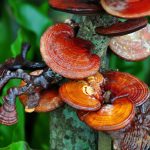5 ways Reishi mushroom can help to IMPROVE immune system function
 (NaturalHealth365) Let’s be blunt: many people don’t feel well because of low immune function. With the immune system vulnerable, potential unwanted pathogens can take hold, making it more difficult to stop healthy cells from remaining healthy. Sadly, too many (conventionally-trained) healthcare providers fail to focus on the importance of the immune system.
(NaturalHealth365) Let’s be blunt: many people don’t feel well because of low immune function. With the immune system vulnerable, potential unwanted pathogens can take hold, making it more difficult to stop healthy cells from remaining healthy. Sadly, too many (conventionally-trained) healthcare providers fail to focus on the importance of the immune system.
But, we shouldn’t be surprised with the millions of deaths associated with low immunity – especially when you consider the loss of minerals in our farming soil, the overabundance of sugar in the diet, artificial ingredients inside too many heavily-processed foods, plus the proliferation of GMOs.
Conventionally-trained healthcare providers know little to NOTHING about nutrition, herbs and mushrooms
For example, according to world-renown mycologist Paul Stamets, ‘of the 140,000 species of mushroom-forming fungi, science is familiar with only 10 percent.’ Such a shame – when you understand that mushrooms are some of the most potent natural remedies on the planet.
Thankfully, many scientists are looking at health benefits within the plant kingdom – especially with regard to the Reishi mushroom. Known for its immune-building and anti-aging virtues, more recent research highlights the multi-mechanistic power that makes Reishi a super ‘immune system helper.’
How does Reishi help the body to stay healthy?
Based on clinical evidence, here’s a summary of the findings:
Reishi assists the immune system in preventing pathogens from getting out of control. You see, when your body is low in energy and struggling to function properly, it’s more vulnerable to “secondary attacks.” Consuming Reishi mushrooms will reduce the risk of secondary attacks.
Reishi helps with breast health. Many studies confirm that Reishi is a suitable (therapeutic) food for breast cell health. In fact, the Journal of Nutrition and Cancer published findings from researchers that showed Reishi mushroom consistently inhibited cell invasion. This is so important to keep the breast tissue healthy and strong.
Reishi has multi-faceted immunomodulatory effects. Studies highlight how Reishi can identify potential pathogenic invaders by amplifying natural killer cell activity. Because Reishi’s therapeutic action can break down fibrinogen, an outer layer that protects “sick” cells, they are more susceptible to cell death. Keep in mind, “cell death” is a natural healthy part of life.
Keeping healthy cells intact has been demonstrated by Reishi. In a study observing its effects on cell-mediated responses, Reishi inhibited cell colony formation and cell migration demonstrating its ability to protect already healthy cells. The study also highlighted how Reishi takes action to assist in inhibiting (unwanted) rapid cell division.
Reishi regulates programmed cell death. Referred to as apoptosis, reishi extract can stop rapid cell division in their tracks. Eventually, all healthy cells die, but certain cells do not undergo apoptosis and divide endlessly, wreaking internal havoc on the body. Reishi reduces the risk of this process.
What’s the best form of Reishi mushroom?
Remember, not all Reishi supplements are created equal. To access the benefits that have been obtained in studies, it is essential to use standardized Reishi extracts containing assayed levels of Ganoderma Lucidum, the active therapeutic agent. Of course, you can also look up ways to add reishi mushrooms to your favorite dishes.
In terms of supplementation, ask your integrative healthcare practitioner (or health coach) to suggest a proper amount and high-quality Reishi supplement that best reflects your needs. And, while you’re at it, ask how you can incorporate Reishi mushroom into your regular diet. Enjoy!
Sources for this article include:



